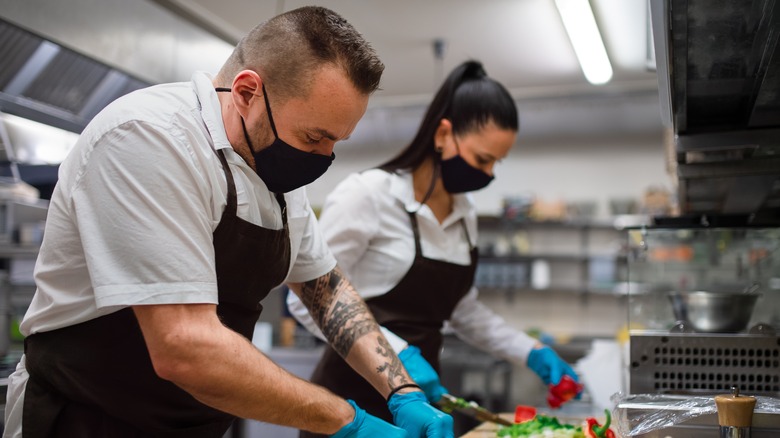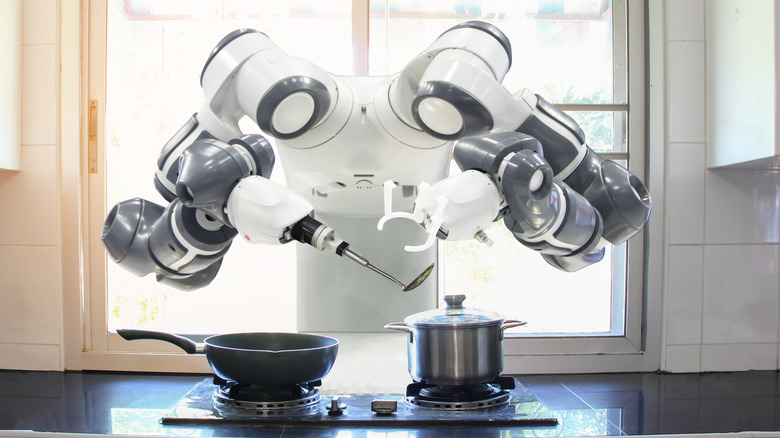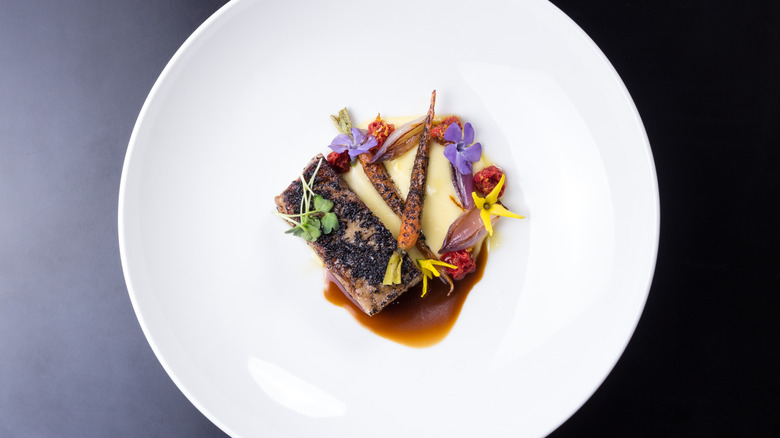AI Is Attempting To Take Over The Restaurant Kitchen
These days, artificial intelligence is everywhere. Whether it's generating a deepfake, driving a car, or waxing poetic on which fast food restaurant has the best burger, it's hard to avoid the applications of this technology. Now, it may arrive in one of the most shocking places yet: the kitchen.
Startup CloudChef plans to revolutionize the restaurant industry with AI. Its technology aims to make anything from the world-class dishes of Michelin-starred chefs to TikTok trends to even a recipe from someone's grandmother accessible to all. CloudChef provides more than just a detailed recipe: It claims to be capable of distilling and digitally transmitting a master chef's technique and intuition. This could bring dishes from the kitchen of a white-tablecloth restaurant, or the mind of a chef, to places and audiences that might not normally see them. Imagine a world in which an untrained worker in Idaho, for example, prepares a dish designed by a famous Italian chef, and it turns out just how the chef intended.
CloudChef uses "co-botting," a term referencing collaborative robots, which require human assistance to complete tasks. However, it acts as both brain and nervous system for the kitchen. Rather than simply providing guidance to amateur chefs with little or no training, it automates things, like the process of checking if a sauce or a piece of meat is done using temperature monitoring. CloudChef can control appliances as well, which may leave some wondering how long until it takes over the restaurant kitchen entirely.
A digitized future
Technology in the kitchen has been growing at a breakneck pace. Since COVID accelerated the growth of ghost kitchens, innovations like Grubtech's Cloud Kitchen and automated delivery become more omnipresent each year. A race for automation that promotes efficiency and ease of restaurant operations is understandable, though some fear the downsides.
Aside from CloudChef's latest splash, AI has already started to penetrate the food service industry in less flashy ways. For example, conversational AI may be coming to a drive-thru near you, promising a fix for long wait times, order mistakes, and labor shortages. Fast food restaurants are also learning to predict your order using everything from face recognition to eating habits. In the home kitchen, things are advancing even more quickly. Samsung's "Food AI" suggests recipes by monitoring the ingredients you have in your fridge, dietary restrictions, and the weather. Fully smart kitchens and robotic kitchens that can both cook and clean are well on their way too.
Will CloudChef's plan work?
On their website, CloudChef claims that blind taste-testers "haven't been able to differentiate" their dishes from those cooked by trained chefs. The appeal for everyday diners is certainly understandable: CloudChef gives them access to more affordable (and, in theory, equally tasty) versions of gourmet dishes. On the other hand, the appeal to chefs and kitchens could be a harder sell.
The AI startup styles itself as a sort of culinary Spotify, promising to pay chefs royalties each time their recipe is cooked using CloudChef. Some clients, like Michelin-star chef Srijith Gopiathan of Ettan, already have their dishes featured and available for delivery from the CloudChef website. Gopiathan praises the software as "automation with a soul." Nevertheless, whether or not the system will appeal to more chefs and be implemented in everyday restaurant kitchens remains a big question mark.
For now, CloudChef is in use in the California Bay Area, with a current focus on Indian cuisine and plans to expand. The startup's goal is to gather as many recipes as they can–they currently have around 100–to cook in CloudChef kitchens. With a fair amount of people already taking them seriously, it's likely more of the industry will want a taste of this technology soon.


